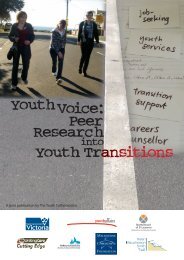Second Survey School and WOW.pdf
Second Survey School and WOW.pdf
Second Survey School and WOW.pdf
You also want an ePaper? Increase the reach of your titles
YUMPU automatically turns print PDFs into web optimized ePapers that Google loves.
WORKING GROUP: TRANSITION<br />
the labour market, e.g. ICT‐businesses or other highly developed companies. The British<br />
researcher Helen Colley draws a somewhat different picture of the present dem<strong>and</strong>s when<br />
referring to the fact that: „Hairdressing, warehouse‐keeping <strong>and</strong> shelf‐stacking are three of the<br />
fastest‐growing occupations in the UK“ 33 . This implicates, as she states, „a rather different<br />
face on the ‘choices’ on offer“, but it also calls for a more diversified approach when trying to<br />
interpret labour market dem<strong>and</strong>s.<br />
Finl<strong>and</strong><br />
Today’s society is often depicted in terms such as the information society, knowledge society<br />
or network society to describe essential features characterising its current developments. The<br />
most visible element of this new society is naturally the rapid development of the information<br />
<strong>and</strong> communication technology <strong>and</strong> the fast increasing amount of information. Furthermore,<br />
the growing production of knowledge, increasing networking between organisations <strong>and</strong><br />
individuals, <strong>and</strong> changes in occupational structures <strong>and</strong> contents of work are typical<br />
developments of the information society.<br />
The conditions of knowledge production have also changed. New kinds of industrial production<br />
are dependent not only on new information technology but also on new kinds of expertise.<br />
Many organisations have become knowledge intensive innovation centres in which<br />
collaborative work, networking, <strong>and</strong> transformative <strong>and</strong> creative learning have become key<br />
concepts in organisational development.<br />
Table 2: Trends related to the working life in information society <strong>and</strong> corresponding<br />
qualifications of employees. (Tynjälä, 2006)<br />
33 Colley, Helen 2004<br />
‐ 76 ‐




